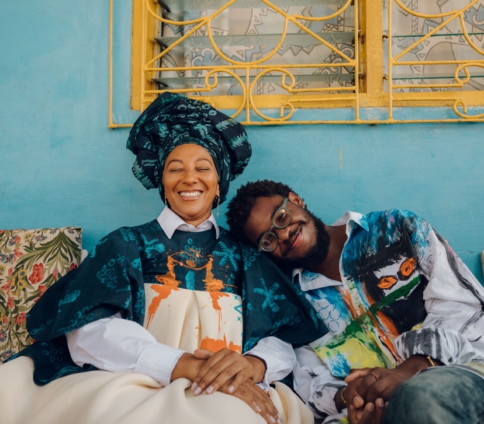Ghanaian fashion is known for its use of vibrant colors and eclectic prints, and nowhere is this joyful approach to dressing more apparent than in Accra, the country’s capital city.
The fashion hub is bursting with local artisans and designers, all of whom specialize in reinventing traditional kente or fugu clothes with a modern twist. Mercedes-Benz Fashion Week Accra has been spotlighting the best of Ghanaian fashion for the past four years, but of course it was postponed this year due to the pandemic.
The event has delivered some beautiful textile work in the past, infusing the catwalks with a high dose of energy via tie-dyes, screen printing, and more—all of which are created ethically and sustainably within the city.
Without the presence of live shows this season, Mercedes-Benz still wanted to spotlight the work of local West African talent.
It did so by producing a special photo series, shot by Carlos Idun-Tawiah, that showcases the new collections of five Accra-based designers: Larry Jafaru Mohammed, Steve French, Hassan Alfaziz Iddrisu, Atto Tetteh, and Chloe Asaam.
These five Ghanaian designers are not to be missed, despite the lack of physical shows this season.
The through line between these emerging talents? Their distinctive brands all focus on innovating traditional Ghanaian textiles, implementing eco-friendly production methods, and celebrating a sense of Pan-Africanism.
They all design and create out of Accra, partnering with local creatives there to source their unique textiles.
Even though their fabrics are traditional, their designs are anything but—their works take cues from the streetwear movement, modern and abstract art, and even the city of Accra itself, making for collections that are contemporary but infused with a culturally rooted spirit.
As French calls his vision below, they’re pushing forward “fashion with a cause.”
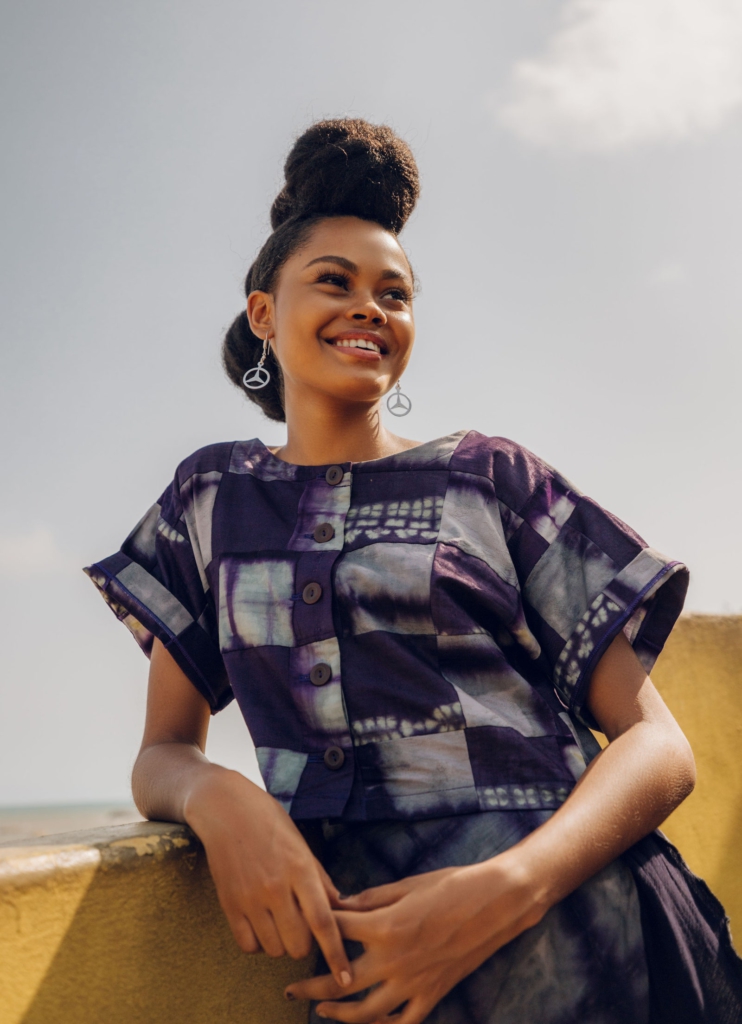
Designer: Larry Jafaru Mohammed
Founded in: 2017
Origin story: The designer, who was born and raised in Accra, began his career designing his accessories line in 2012. He pivoted to ready-to-wear around 2016, and launched his label a year later. Mohammed saw an opportunity to use clothing design to support local artists.
“When I started my brand, I wanted to work with people in my community, and empower local artisans and craftsmanship,” says Mohammed. “I also try to recycle and upcycle things that I find in my community.”
Signature aesthetic: Larry Jay is an ethically made, unisex collection that draws inspiration from African culture, textiles, and nature—combining them with modern, streamlined silhouettes. There are exquisite camp-collar shirts and chic swishy skirts.
“Most of the time, I look up to the cultures we have here in Accra, but I also look to cultures that we have in other African countries,” he says.
The new collection: Mohammed recently debuted his spring 2021 Nomad collection. “It emphasizes tradition and comfort,” he says. “It’s inspired by travelers who like to explore, learn about people and their cultures, and have an appreciation for nature. I like to do a lot of monochromatic looks, so for this collection, I used a lot of purple.”
He also focused on tie-dye this season. “Tie-dye has been one of the most common fabrics here,” he says. “Our parents used to get it for themselves and for us. I also shot some of the pieces on my parents, who influence my brand a lot; their pictures from the ’70s are so great.”
Current inspiration: The designer finds inspiration from the people and locals in his city. “Creating this collection during the global pandemic really dampened my will to continue the collection—but, it reminded me that we are all one people,” he says.
“When I showed this collection [in October], we used models of different races and religions to preach peace and solidarity. We’re all cut from the same fabric of love.”
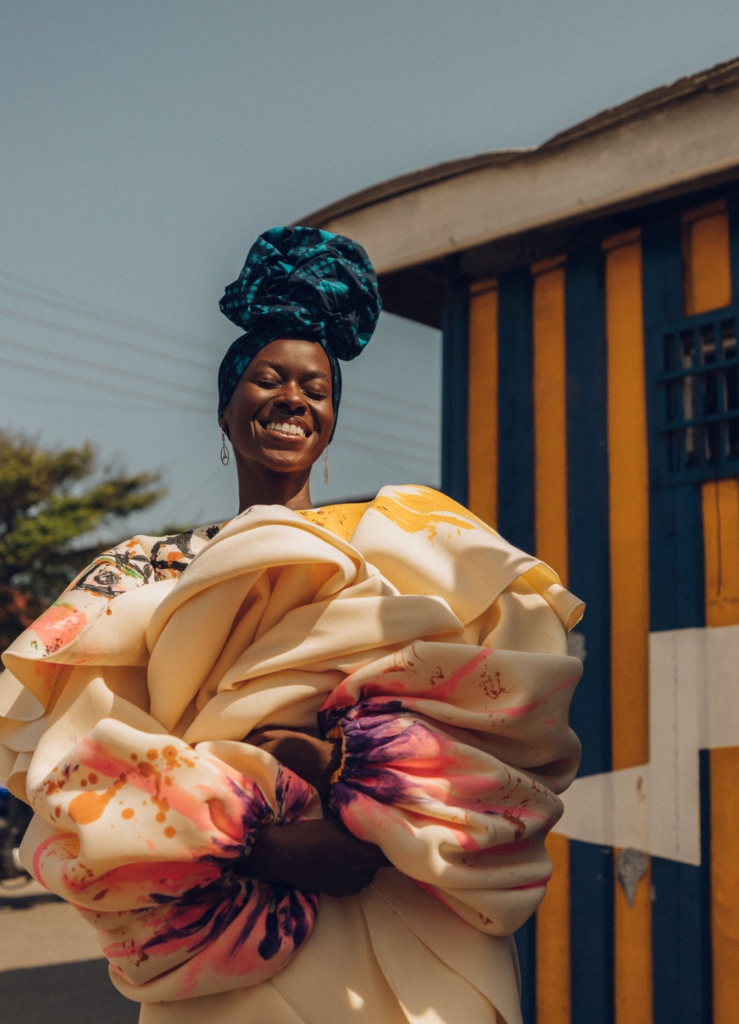
Designer: Steve French
Founded in: 2016
Origin story: French is originally from Axim, the western part of Ghana, but is now based in Accra. He grew up with a fascination around fashion. “Fashion came to me at age seven,” he says. “I was drawing a lot of cartoons like Mickey and Minnie Mouse, and I developed a love for what the cartoons were wearing.”
French launched his label with the hopes of supporting and fostering a fashion community in his city. “Now, I believe in fashion with a cause,” French says. “I work with a lot of local artisans. I want to make clothes that not only impact the lives of the people wearing it, but also in the lives of the people [making it], and the village [where it’s being made].”
Signature aesthetic: French is a contemporary womenswear designer who “honors traditions to create new artistic expressions with clothing,” drawing from the female form and abstract patterns in particular—think lots of feminine gowns and skirts, done in vibrant colors and artful prints. “My clothes are deep-rooted in my culture,” he says.
The new collection: For his latest collection, French channeled his childhood memories from his time in Axim. “I [grew up around] seamstresses, and I feel like that’s a tradition that’s now been transferred onto me to tell,” French says. “I used a lot of neoprene and I experimented with abstract painting, [painting images] onto pieces based on stories that have been told to me. I did that on tops, skirts, and dresses.”
Current inspiration: French has found hope in peace in slowing down and focusing on his art. “I’ve been documenting a lot during this time. Researching and exploring new things that I had never thought of in this time of stillness,” he says.
“I took this time to actually pause and reflect on myself as an artist, and I’m seeing fashion in a new way. Inspiration is all around us: It’s from the woman selling by the roadside, from the music that we listen to.”
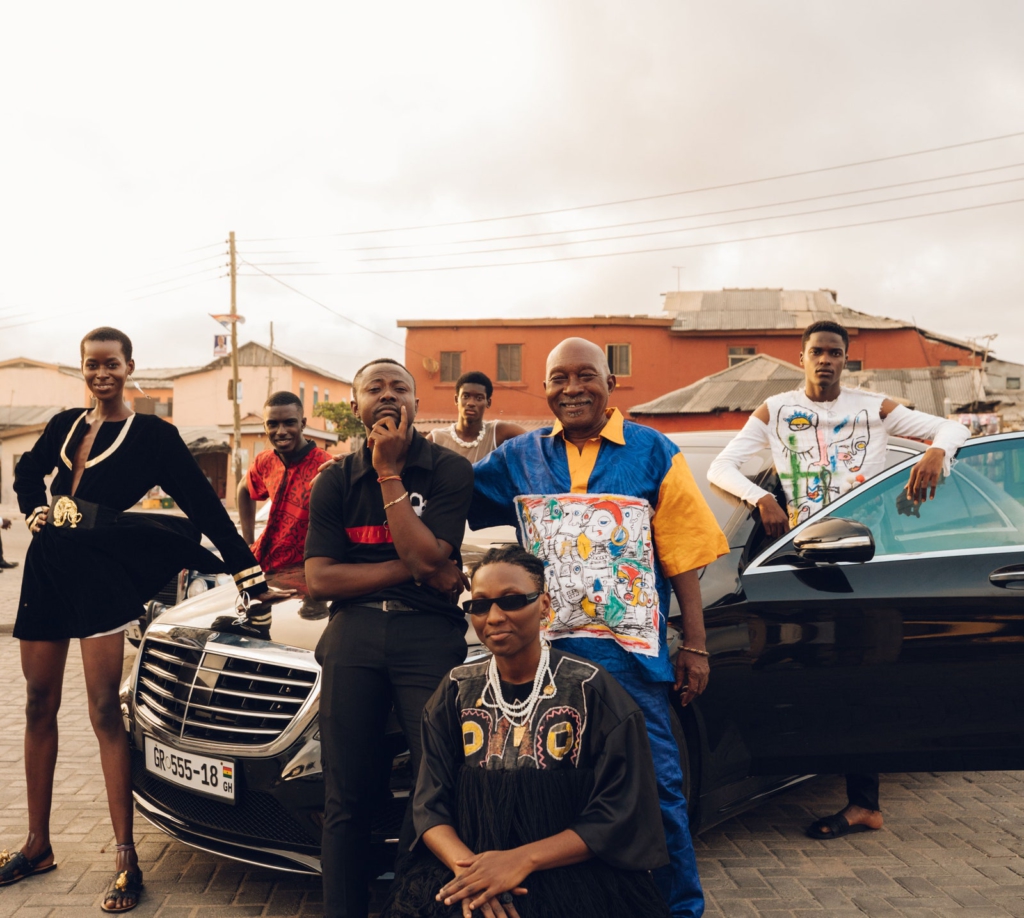
Designer: Hassan Alfaziz Iddrisu
Founded in: 2013
Origin story: Iddrisu—who is from Kumasi, but now based in Accra—got his start in fashion by dealing secondhand vintage wares in Accra. “I’m a lover of rare things,” he says. “We have a vintage market here, Kantamanto, and I would search for all these things.”
Eventually, he began taking these vintage pieces and deconstructing them, creating his own original designs. “I didn’t know how to sew or cut; I just had an idea,” says Iddrisu. “Then, people started wanting to buy it.”
Signature aesthetic: Hazza is his ethically made, unisex sportswear brand fusing African pride with traditional production methods. Iddrisu’s relaxed tailoring and smartly cut pieces are often made with repurposed fabrics. His specialty is breezy suiting and utilitarian shirts—always in sprightly hues.
The new collection: The designer’s pieces for the Mercedes-Benz shoot are a mixture of his recent spring Afrafradom collection, as well as some pieces from his university graduation collection. “I work a lot with tie-dye and screen printing,” he says of his pieces, adding that an eco-minded approach has been ever present in his designs.
“Sustainability, for me, starts with the fabric sourcing. Even in Accra, we have one of the biggest landfills in West Africa, which is terrible. I use a lot of discarded fabrics; most of my fabrics are from Kumasi, which is where I’m from. I use fabrics that nobody buys and would end up as junk, then I print or dye them into how I want it.”
Current inspiration: Iddrisu is inspired “by the people around me—our lifestyle and our culture,” he says. “When I want to get inspiration, I go to the places that people don’t really want to go, like the slums or the non-bougie places. From where I’m coming from, I’m connected to those places, and that’s where you’ll find the real culture of Ghana.”
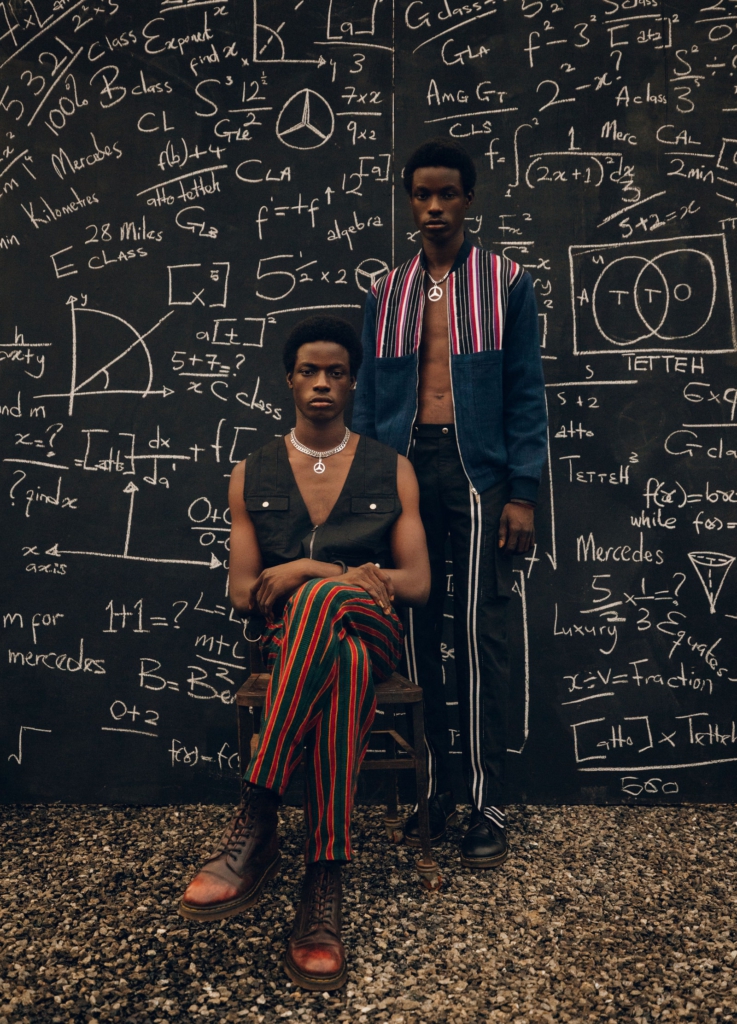
Designer: Atto Tetteh
Founded in: 2014
Origin story: Tetteh, who is Fante and Guan, actually studied insurance in school, but decided to follow his true passion and launch his own menswear line in Accra. “I felt that I had something to contribute to the creative space in Accra,” he says.
“There are a lot of brands in Ghana that do womenswear—I feel like when it comes to fashion, men need affirmative action. The menswear scene is still pretty small [here].”
Signature aesthetic: The designer offers sleek menswear pieces—though they can be unisex—with a focus on reinventing traditional African patterns for the modern man. “My brand is a contemporary streetwear brand, for men who are cosmopolitan but want an African aesthetic,” he says.
“We always make sure that our pieces reflect our Africanness, but can also be appreciated by anybody who has never been to Ghana or Africa, and just loves fashion. Africa is very vibrant, so we incorporate a lot of color.”
The new collection: Tetteh’s new collection is called S Theorem. It “tells a story about how we are all very different and unique, and how we should appreciate each other and our differences,” he says. “Ghana is upbeat—there’s always movement, color, and a sense of happiness.
All of these things influence my design.” The designer used fabrics for the line that are all handmade in Ghana. “Fugu is mostly striped, and kente has geometric patterns,” Tetteh says. “As much as we’re selling our culture and who we are, we also want to create jobs and show our artisans to the rest of the world.”
Current inspiration: Like many creatives, Tetteh has sought to find hope and optimism during these difficult times. “Covid-19 has given us a lot of time to be with family, and to be by ourselves, to think about all that we’ve been doing,” he says.
“Living the modern life can be very fast. The period where we were under lockdown, we had time for ourselves to rethink our strategy. The world has come back to a point where we can actually be slow with how we move, and appreciate the things that we have now.”
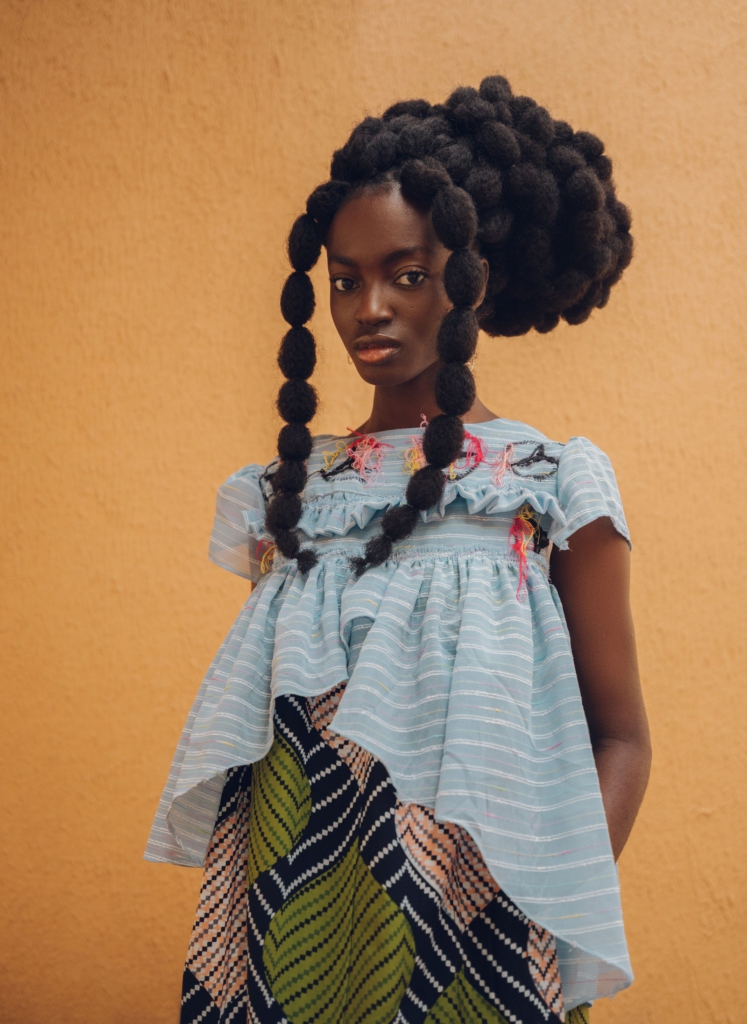
Designer: Chloe Asaam
Founded in: 2019
Origin story: Asaam, who was born and bred in Accra, decided to pursue fashion after growing up around the city’s massive second market. “There’s a huge secondhand market in Accra, and it really takes away from the work that we do as young creatives,” she says.
“As designers, you’re forced to be in really small markets, and it limits your opportunities. I’m looking to show people that they can buy into a brand like mine: You can buy eight pieces, and have 25 or 30 different styling options for the next four or five years.
You don’t have to be constantly buying secondhand fast fashion just because it’s available to you.” She also hopes to combat the environmental impacts of these markets, as she says many of its unsold pieces end up in landfills. “I reuse and repurpose a lot of fabrics from them—a lot of cottons, linens, and breathable fabrics,” she says.
Signature aesthetic: Chloe Aasam is a womenswear label fusing Ghanaian prints with strong, interesting shapes. They’re basics, but never basic: She enjoys reworking everyday staples, including ruffled tops, high-waisted trousers, and dresses.
The new collection: This is Asaam’s first collection. It’s inspired by “the moods and sentiments that we’ve had during the pandemic,” she says. “I used color schemes or words that speak to the things that we gravitate towards when it’s a crisis, or when we are feeling a bit agitated and uncomfortable.
For colors, I used a lot of muted tones like greens, ochers, and tans—colors that really speak to the earth, and going back to feeling at home and grounded. And a lot of loose silhouettes, because you want to feel free and easy. You want to wear something that makes you not feel as restricted as you are in life.”
Current inspiration: Asaam says the women in her own family are her muse. “I tap into the matriarchs in my family and my community,” she says. “I find women to be really powerful, especially in a local context, because they keep us together and are really nurturing and strong at the same time.
I feel like we don’t really appreciate and talk about them a lot, because it’s still a really male-dominated community and culture. The women in my life are really strong and really powerful, and have been able to teach me and grow me into the woman that I am right now.”
Latest Stories
-
Amazon Web Services and AmaliTech collaborate to train more than 5,000 people in cloud computing in Ghana
17 mins -
Inflation to decline to 24.6% in April 2024 – Report
22 mins -
Dancehall Queen Aklerh thrills patrons at EP listening
26 mins -
Bond market: Total turnover upturned to GH¢1.14bn
35 mins -
Stanbic offers financial solutions to members of Ghana Medical Association
46 mins -
“Dmusor” has brought businesses to their knees – GNCCI expresses frustration at ongoing crisis
52 mins -
Ghana’s electricity access likely to increase as World Bank begins initiative
53 mins -
We need a comprehensive data on the culture and creative sector– GCF to Egyapa Mercer
60 mins -
Veil on asset declaration should be lifted – Osafo-Maafo
1 hour -
I have been paid with malt drink and meat pie after performing – Kofi Sarpong
1 hour -
Child mortality drops to 32% nationwide in 2024 – Patrick Kuma-Aboagye
2 hours -
Cedi to bounce back to appreciating trajectory soon – Fitch Solutions
2 hours -
Dumsor: Finance ministry failed to pay power generators over GH₵1.2 billion under the CWM – PURC report
2 hours -
Toddler mauled by dog undergoes successful plastic surgery
2 hours -
Pepsodent champions with #TalkToADentist initiative at World Oral Health Day 2024
2 hours

